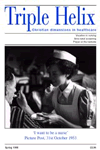The title of this book is misleading and raised my feminist hackles, but the subtitle describes it, and for anyone wanting information on this topic here is a useful handbook. With its authors coming from a number of European countries, the emphasis throughout is helpfully European rather than British.
For non-geneticists an appendix answers basic questions and there is a chapter giving a full explanation of some of the technical aspects of genetic manipulation. This may well be too detailed for most of those likely to read the book, but it is a reader-friendly account.
Luis Archer, Professor of Molecular Genetics in the University of Lisbon and bioethics consultant to the European Commission, describes the genetic testing currently available and the concerns it should raise and then makes suggestions as to how these should be tackled. His discussion of the pros and cons of germ-line treatment is a model of cool sanity with justice issues stressed.
David King, editor of GenEthics News, writes the chapter that is relevant to all. He agrees with the establishment view that eugenic schemes as practised earlier this century are unlikely to be repeated. He accepts the dogma of free parental choice in the matter of genetic screening and pre-natal testing, but points out how easily this can lead to what he calls 'laissez-faire eugenics'. Parental choice may appear to be free, but in reality it is usually driven by sociological pressures based on negative attitudes to disability and poor provision of services for the disabled. He argues for the voice of the disabled (or their advocates) to be more prominent in public debate. (Here perhaps is a role for the churches and Christian health professional organisations.)
Christian Byk, Professor of Legal Studies in Poitiers University and a member of The Human Genome Organisation, gives an account of law and regulation in Europe. This is a useful source of information and is up-to-date enough to include the response to Dolly the cloned sheep. Emy Lucassen from Greenwich is rightly concerned about the validity of informed consent of those undergoing pre-natal screening, but finds the law of little help in rectifying this.
Although the authors may well all be Christians and adopt a thoroughly Christian attitude in their chapters, there is no overt Christian input to the book. There is also hardly any of the paranoia which so often clouds discussion of genetic technology. It is difficult to know quite which readers of this review would value the book but it is a useful resource for any who want information on the legal aspects of medical genetic developments.
Reviewed by
Caroline Berry
(Clinical Geneticist, Kent































